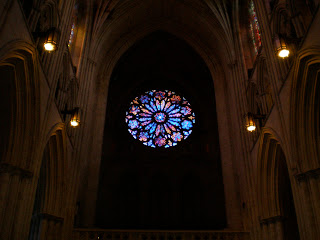As Advent has progressed, I've been tempted to gloss over the readings that occur every year during this season. Isaiah's prophecy about swords being beaten into plowshares? I've heard that one before. The vision of the peaceable kingdom on God's holy mountain? I know it well. The long genealogy in the opening of Matthew's Gospel? So many names... and usually an opportunity to congratulate a new deacon for making it through the list!
 |
| Boston Public Library |
My many neighbors in Boston have their routines– those who scour recycling buckets, those who commute to work, those who drive commuters on the T– just as I have my training schedule, my slate of theology classes, and my regular chores and duties around the community. The repetition there is a good thing: I maintain my health, contribute to the functioning of the house, and fulfill my mission to study. People work to make ends meet, to keep this fine city going, and so on. Repetition can be virtuous, but it can be vicious when it turns into monotony. I still don't know how people deal with stop-and-go traffic on I-93 or the Mass Pike every weekday, even with an array of beneficial distractions available. I try to notice something different on every run, a bit of a challenge when I've memorized almost every square foot of pavement along my regular routes.
I wish I could say that I've regularly done the same with my prayer over the Advent readings these past few weeks. My seminar on Isaiah this semester lent me some insights that fostered a fresh reading of those prophetic texts. Yet I'm still striving to see something new in the pre-Nativity stories from Luke's Gospel, an unanticipated meaning in Paul's writings, or a vivid metaphor in the language of the Psalms.
Amid these final days of Advent, and my imminent journey to South Jersey to spend Christmas week with my family, I'm praying for the grace to do more than mere recycling of past memories of liturgical readings, holiday celebrations, and running or walking around my old neighborhood. This time through the old routine, there's bound to be something new. And as the Church invites its community and the broader world to once again open itself to Christ through recollection of the Incarnation, there are countless lives yearning for something new.













